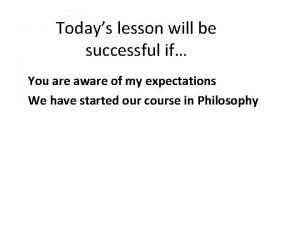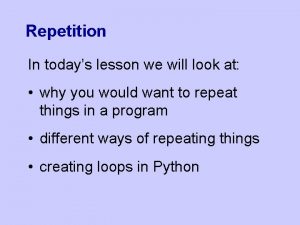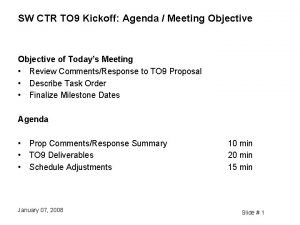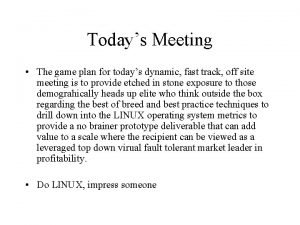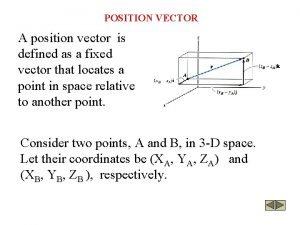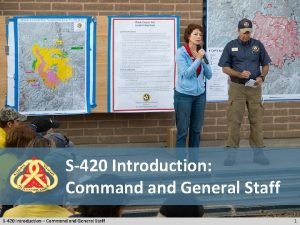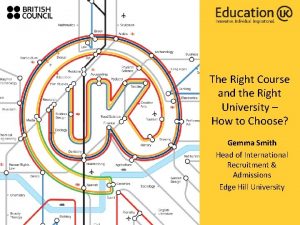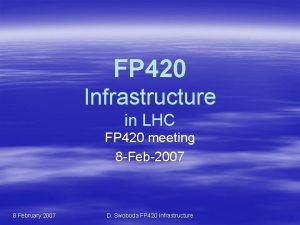TODAY Thursday 420 1 I want to prepare



















- Slides: 19

TODAY: Thursday 4/20…… 1. I want to prepare you for your DBQ tomorrow SO, FIRST we will review SYNTHESIS right now. 2. THEN, we will go over CHINA (this is the focus of your DBQ), so if you have prepared C 31 CHINA chart, we are on today…. . 3. IF there are still artifacts that need presenting, that will follow all of the above…. . 4. IF there are WWs test to go over, it will follow all of the above…. 5. IF we run out of time for #3 and #4, then we will finish THOSE on Monday…

China and Japan: 19 th century Pressures Why “ The C rossro ads”?

The Historical Context for China’s issues at these “Crossroads” has EVERYTHING to do with: • Imperialism • the increasing strength of EUROPE and JAPAN


CHINA: Opium Wars and Unequal Treaties 1838 -1842 Since 1759: European trade Limited to port of Guangzhou Foreign merchants forced to deal with Chinese firms called cohongs: ONLY trade in silver buillon WAR! 40, 000 chests of opium a year shipped to China by 1838 Commissioner Lin Zexu rejected by Queen Victoria (PAGE 719) Lin Zexu confiscated and destroyed 20, 000 chests of opium Forced to grant extraterritoriality status UNEQUAL TREATIES/ Spheres of Influence

Unequal Treaties • • According to the 1842 Treaty of Nanjing, the Chinese were to: Reimburse Britain for costs incurred fighting the Chinese Open several ports to British trade Provide Britain with complete control of Hong Kong (returned July 1, 1997) Grant extraterritoriality to British citizens living in China REACTION? Taiping Rebellion 1850 -1864 Self-Strengthening Movement 1860 -1895 “Chinese learning at the base, Western learning for use” (technology) (not as radical: but contradictory and undermined Confucian tradition Opposed the Manchus: 1885 Britain took Burma x? wanted radical e s No ms for 1886 France took Vietnam Social change, no e r a s H ader footbinding, no private le 1895 Japan took Korean property, free public ed, independence no concubinage (men and women equal) 1898 Spheres of Influence 20 -30 million lives lost Massive decline in 1898 Hundred Days Reform? Proto-industrialization economy/ food Cixi nullifies

• Anti-foreign • Anti- Chinese Christian • Anti- Chinese who helped the foreigners China: The Boxer Rebellion 1899 -1900 Society of Righteous and Harmonious Fists Chinese Empress Dowager Cixi

Puyi (2 yrs old) Last emperor of China 1908 -1912 University of Pennsylvania 49 lb flawless crystal spheresecond largest in the world

Societies at the Crossroads: China 1750 -1914 Social popular uprisings 1850 -1860 s Taiping Rebellion defeated by Qing and foreign troops (1864) government slaughtered 100, 000 Taipings Hundred Days reforms 1898 ________________ 1896 Spheres of Influence 1899 -1900 Boxer Rebellion (Empress Dowager Cixi supported militia against foreigners) 1900 - Chinese leaders no longer in control of economy 1912 - collapse of the Qing Dynasty Political Qing Dynasty (Manchus) 1644 -1911 British introduced opium to end cohong system Opium War (1839 -1842)- Chinese easily defeated unequal treaties Treaty of Nanjing 1842 lost tribute states of Vietnam, Burma, Korea, Taiwan

Societies at the Crossroads: China 1750 -1914 Interaction with The Environment Extremely geographically diverse Led to policy of isolationism Always has problem of securing enough arable land for growing populations (terraces) ______________ CULTURE BEFORE: tight control of foreign trade/ foreign contact/ cohong system agrarian/ little demand foreign goods AFTER: unequal treaties ultimately severe economic decline (eating grass, human flesh) "Self Strengthening" Movement (1860 -1895) failed Confucianism still strong under Manchu rule unequal treaties allowed Christian missionaries Qing widely known as patrons of the arts (Qianglong especially) ECONOMIC

Intermittent Civil War Global National Identity Crisis: China PROBLEM: Revolutionary and nationalist uprising in response to increasing Western influence and threat= Fall of Qing Empire 1911 (Puyi) Three Principles of the People: War lords remain powerful - Elimination of special privileges Road to a SOLUTION: foreigners - National reunification Dr Sun Yat Sen (1866 -1925) = PROCLAIMED Chinese-republic 1912 Economic development Democratic republican Chinese republic failed = control fell into hands of- warlords government based on universal suffrage “The continued sway of unequal treaties and other concessions permitted foreigners to intervene in Chinese society. Foreigners did not control the state but through their privileges, they impaired its sovereignty. ” World War I = Missed opportunity: no support for Chinese self-determination – thought end of war would end unequal treaties but instead supported further Japanese aggression. . . May Fourth Movement (Chinese students/ intellectuals rebel against Foreign Japanese aggression ) Communism = Chinese Communist Party 1921 Mao Zedong Nationalists = Sun Yatsen then Chiang Kai-Shek(1887 -1975)

China 1927 -1936 Sun Yatsen/ Chiang Kai-Shek (Jiang Jieshi): • Nationalist in contrast to Communists (Three Principles of the People (nationalism, socialism, democracy) = no special privileges foreigners, national reunification, economic development, democratic government, universal suffrage) • Did not believe in social revolution that involved the Chinese masses (Sun Yatsen dies……. Enter: Chiang Kai-Shek) • shunned partnership with the Communists (especially as the Chinese Communist party becomes more unified) • avoided Great Depression/ supported agrarian economy not connected to global economy • Problems = only control small part of China, warlords still in control in some areas, Communist revolution still a threat, could not ward off Japanese aggression World War II? Mao Zedong: Communist Revolution 1949 • Political radicalism opposition to arranged marriages • women’s equality and right to divorce campaigned against footbinding • Leader of the Long March (6215 miles) women’s equality/ socialism • ideology: Marxist-Leninist (Maoism)= RAPID INDUSTRIALIZATION/ COLLECTIVIZATION of agriculture • Peasants rather than urban proletarians were the foundation for a successful revolution

tes of a t s t is n u m m o In the c hina, C d n a ) n io n U (Soviet ed their ll o r t n o c s t n e governm mies… national econo Brave the wind and the waves, everything has remarkable abilities, 1958

tes of a t s t is n u m m o In the c hina, C d n a ) n io n U (Soviet ed their ll o r t n o c s t n e governm mies… national econo The Great Leap Forward: 1958 -1961

Great Leap Forward 1958 -1961 • Promoted industrial output over agricultural production • Result: an agrarian catastrophe that led to death by starvation of nearly 20 million people • BLAME? Capitalist West……. The commune is like a gigantic dragon, production is visibly awe-inspiring, 1959

Eliminating the last sparrow, 1959 Everybody comes to beat the sparrows….

Cultural Revolution 1966 -1976 • Goal was to purge all vestiges of western influence • Widespread government persecutions and Re-education centers • Mao’s Red Guards: mostly teenagers given unlimited powers/ only answer to Mao himself • Intentional mutilation of Red Book = death • Many high ranking Communist Party officials were killed • China reports 1 million killed BUT others say closer to 30 million


Mao Zedong (1893 -1976)
 Thursday420
Thursday420 How is the weather answer
How is the weather answer Mother i want to prepare dinner
Mother i want to prepare dinner Today's lesson or today lesson
Today's lesson or today lesson How was today's class
How was today's class Example of repitition
Example of repitition Proposal kickoff meeting agenda
Proposal kickoff meeting agenda Fingerprint galton details
Fingerprint galton details Today meeting or today's meeting
Today meeting or today's meeting Cartesian vector example
Cartesian vector example Esco mobile
Esco mobile Enve420
Enve420 S-420 class
S-420 class 420 ucas points
420 ucas points Major minor patch build
Major minor patch build Measures of dispersion definition
Measures of dispersion definition Mis 420
Mis 420 Enve 420
Enve 420 Issues in operations management
Issues in operations management 420 software
420 software



